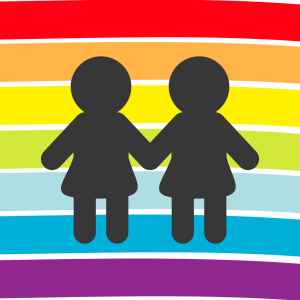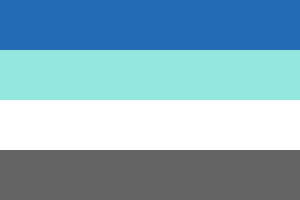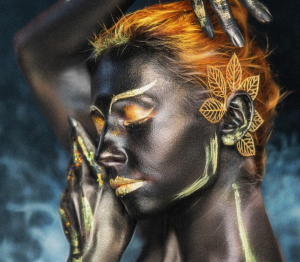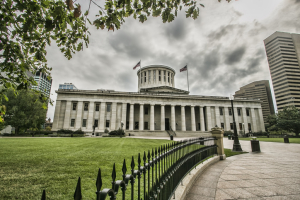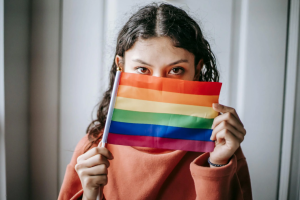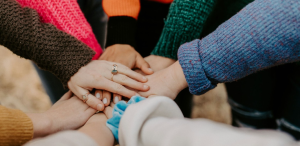Install the app
You are using an out of date browser. It may not display this or other websites correctly.
You should upgrade or use an alternative browser.
You should upgrade or use an alternative browser.
Is bisexuality transphobic?
- Thread starter iammeg
- Start date
No, it's not. Bi is when someone likes 2 or more genders. That could be men and women, men and nonbinary, or any other two genders. Or they could like it more. Trans means someone doesn’t identify with their birth gender. Trans men, trans women, nonbinary, etc. Trans women fall under the women's title. Trans men fall under the men's title.Is bisexuality transphobic? Why or why not?
Bisexual is not transphobic as it means liking two or more genders (Sometimes all genders in some cases). The problem is with its prefix however while it may have meant just two-way way back the definition is updated so it includes NBs as far back as Anything that moves that I can remember but most likely further.
Bisexuality is not transphobic because the capacity to be attracted to someone regardless of their gonads is an inherently transgender characteristic. For it to be otherwise is anathema.
That is to say, whether any transgender person finds someone of the same sex attractive they have that capacity; not everyone does. For example, a couple having one transitioning partner seldom lasts unless the other partner is either bisexual, pansexual, or transgender.
Far from bi- or pansexuality being on the spectrum between straight and gay, I'd say it is instead on the spectrum between cisgender and transgender. I would even go so far as to say that bisexual and pansexual people are what those who are a little trans look like.
Gays and lesbians realize this on a subconscious level: that bi- and pansexual people are not the same as them. This is because marginalized people define themselves by how they depart from the mainstream. Gays and lesbians depart from the norm by sexuality, not gender; whereas transgender people depart from the norm by gender, without regard to sexuality. This leads to gays and lesbians being more parts-centric and bi, pan, and transgender people being more gender-centric.
The lack of a group's departure from the norm is where any possible exclusion of bi, pan, or transgender people comes from. That cisgender straight people exclude gays, lesbians, bi, pan, and transgender people is because they are normal in terms of both gender and sexuality. That some gays and lesbians exclude trans people because they are normal in terms of their gender.
Transgender and, to a lesser extent, bisexual people make gays and lesbians uncomfortable the same way that gays and lesbians make cisgender straight people uncomfortable. Bisexual people make transgender people uncomfortable not at all. On the contrary, as a transgender woman, I am fond of saying: that bi people are my people.
For a transgender person to exclude someone on the basis of their parts would mean condoning their own exclusion, and this simply cannot be. This is why attraction without regard to one's gonads is an inherently transgender quality.
It, therefore, follows that attraction without regard to gonads defining bisexuality means that bisexual people are on the trans spectrum; how could transgender people find themselves offensive?
By definition, bisexual people are a little trans so bisexuality cannot possibly be transphobic.
That is to say, whether any transgender person finds someone of the same sex attractive they have that capacity; not everyone does. For example, a couple having one transitioning partner seldom lasts unless the other partner is either bisexual, pansexual, or transgender.
Far from bi- or pansexuality being on the spectrum between straight and gay, I'd say it is instead on the spectrum between cisgender and transgender. I would even go so far as to say that bisexual and pansexual people are what those who are a little trans look like.
Gays and lesbians realize this on a subconscious level: that bi- and pansexual people are not the same as them. This is because marginalized people define themselves by how they depart from the mainstream. Gays and lesbians depart from the norm by sexuality, not gender; whereas transgender people depart from the norm by gender, without regard to sexuality. This leads to gays and lesbians being more parts-centric and bi, pan, and transgender people being more gender-centric.
The lack of a group's departure from the norm is where any possible exclusion of bi, pan, or transgender people comes from. That cisgender straight people exclude gays, lesbians, bi, pan, and transgender people is because they are normal in terms of both gender and sexuality. That some gays and lesbians exclude trans people because they are normal in terms of their gender.
Transgender and, to a lesser extent, bisexual people make gays and lesbians uncomfortable the same way that gays and lesbians make cisgender straight people uncomfortable. Bisexual people make transgender people uncomfortable not at all. On the contrary, as a transgender woman, I am fond of saying: that bi people are my people.
For a transgender person to exclude someone on the basis of their parts would mean condoning their own exclusion, and this simply cannot be. This is why attraction without regard to one's gonads is an inherently transgender quality.
It, therefore, follows that attraction without regard to gonads defining bisexuality means that bisexual people are on the trans spectrum; how could transgender people find themselves offensive?
By definition, bisexual people are a little trans so bisexuality cannot possibly be transphobic.
Bisexuality is not at all transphobic. Bisexuality is considered the attraction to two or more genders. Even if a bisexual person is exclusively attracted to men or women, or more specific genders, that’s not transphobia. It’s consent. Not having an attraction to genderqueer individuals or other gender is not the same as not having any respect for their identities. You can acknowledge someone without being head-over-heels for them.
If logic was twisted and bisexuality was indeed transphobic, then gay men would be misogynistic, gay women would be feminazis, asexual would be antisocial, and so on.
If logic was twisted and bisexuality was indeed transphobic, then gay men would be misogynistic, gay women would be feminazis, asexual would be antisocial, and so on.



